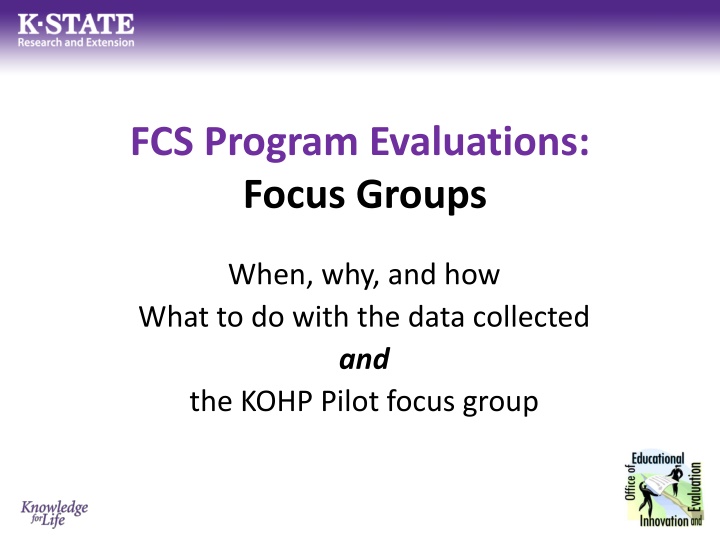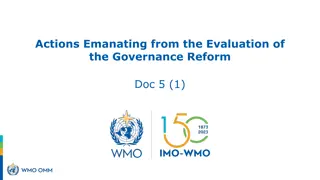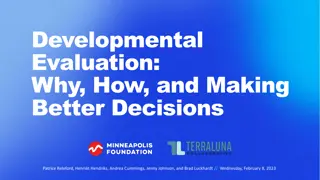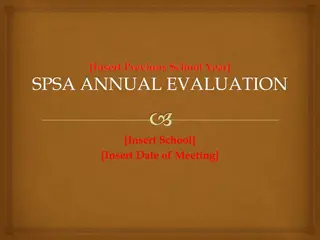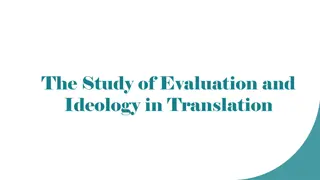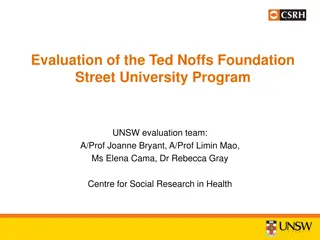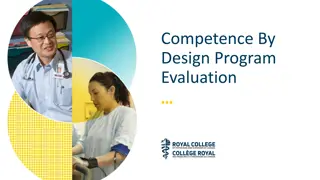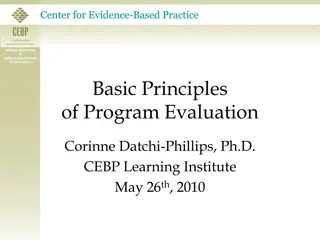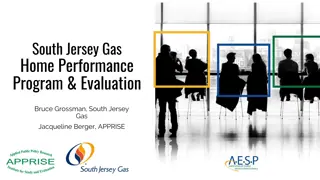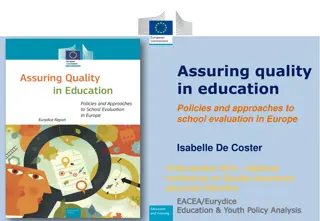Focus Groups in Program Evaluation: When, Why, and How
Facilitated discussions with a target group to gather qualitative data for data-driven decision making. Learn when to conduct focus groups based on your goals, and how to develop, prepare for, and analyze focus group discussions effectively. Find out why focus groups are valuable for program evaluation, as well as tips on developing and structuring questions. Utilize the data collected to affirm program value, improve program continuity, and identify program needs.
Download Presentation

Please find below an Image/Link to download the presentation.
The content on the website is provided AS IS for your information and personal use only. It may not be sold, licensed, or shared on other websites without obtaining consent from the author.If you encounter any issues during the download, it is possible that the publisher has removed the file from their server.
You are allowed to download the files provided on this website for personal or commercial use, subject to the condition that they are used lawfully. All files are the property of their respective owners.
The content on the website is provided AS IS for your information and personal use only. It may not be sold, licensed, or shared on other websites without obtaining consent from the author.
E N D
Presentation Transcript
FCS Program Evaluations: Focus Groups When, why, and how What to do with the data collected and the KOHP Pilot focus group
Focus Groups Defined Facilitated Discussion of a Target Group 6 to 15 people from a defined target audience Goal of gathering specific types of information to support data-driven decision making Can be formal or informal Roles: Participants: Moderator and Assistant Moderator / Documenter Analyzer, Writer, Editor / Verifier Common characteristics but with diversity
When to Conduct Focus Groups Consider Focus Groups, if you Want in-depth qualitative data Detailed success stories Have a short amount of time Seek to affirm the value of the program, identify ways to improve the continuation of the program, and/or identify needs for a program Do not use focus groups if you Want or need quantitative data Survey Require confidentiality or will discuss extremely sensitive topics Interview
Developing Questions Question Basics: Open-ended Simple, easy to remember Write out complex questions for group Move from general to topic (key) questions Avoid why questions Utilize consistent questions for FCS programs
Developing Questions Question Types: Opening questions / Ice Breakers How did you first become aware of KOHP? Introductory questions Thinking back on the tools you learned about, are there any that you continue to use? Transition questions Do you develop action plans to help manage your chronic condition? Key questions Tell us a little about the quality of your life since completing KOHP? Ending questions Is there anything else you would like to share about your experience with KOHP?
Preparing for the Focus Group Recruiting Participants Getting the Word Out Incentives Materials Refreshments Recording Equipment Name Tags, Paper/Pens/Markers Environment Inviting, comfortable for the number of people Arrange the room to accommodate an open discussion
Conducting the Focus Group The First Moments Create a thoughtful, permissive atmosphere Welcome participants as they enter Try to learn names Overview and topic, consent Ground rules First question
Conducting the Focus Group Moderator Tips Prior to the Focus Group Know the questions well, so that you can probe for more detail, alter the question order if necessary to flow with the group During the Focus Group Be ready for the unexpected, but keep your cool and have fun! Pay attention to group dynamics, use strategies to manage
Conducting the Focus Group Documenter Tips Prior to the Focus Group Decide the level of detail you need to document and whether you will be looking to focus on consensus or dissension Develop a field note form with a system to identify quotes, paraphrases, observations of non-verbal communication, and your comments and questions During the Focus Group Take detailed notes organized by question, verbal, non- verbal, and your comments or questions Do not rely too heavily on recording
Conducting the Focus Group Troubleshooting Trickle in effect Mini-Survey will allow you to gather sensitive information or quantitative data, while also maximizing the time when participants are arriving Handling Conflict Big Talkers vs Non-Talkers
Analyzing the Data Collected Analysis Tips Systematic Analysis Approach (Krueger) Pattern Identification (Coding) Note approximate frequency, but be careful how you quantify (e.g., majority, about half ) Non-verbal indicators for agreement, intensity, reluctance Using technology Use what you feel comfortable with: Word, Excel, paper Interpreting the data What is the purpose of the focus groups? What is interesting, surprising, confirming?
Analyzing the Data Collected Analyzing as a team
Analyzing the Data Collected Analyzing in Excel
Writing Up the Findings Reporting Tips Five Principals of Writing (Krueger and Casey) Know the Point and Get to it Quickly Clear, Effective Writing Takes Time Provide Enlightenment Involve People Throughout the Study Use Multiple Reporting Strategies Incorporate visual elements Consider an oral presentation when presenting the written report to stakeholders Using the KSRE Impact Report Template
KOHP PILOT FOCUS GROUP Community Health KOHP Evaluation Laurie Chandler
Questions asked at the February 7, 2012 FCS Update Can you combine more than one target audience into one focus group, e.g., caregivers and those that have a chronic disease? Yes, if it serves your purpose. If you are most interested in understanding the range of experiences individuals have had, it makes a lot of sense to include different groups in your one focus group. However, if you are more interested in gaining an in- depth understanding of a particular experience, like that of individuals dealing with a chronic disease, it may make more sense to only include these individuals in the group. As always, practical constraints may influence your decision to combine the two audiences or do separate focus groups session with each audience.
Questions asked at the February 7, 2012 FCS Update Do you have to have participants sign a formal consent or complete the IRB process for any focus group you do? In all focus groups, consent and confidentiality should be discussed at the beginning but you do not necessarily have to have a signed consent form. If the focus group is designed around your program evaluation, it will most likely fall under the greater umbrella of the Extension human subject protections. Although, if you think that somewhere in the future you will be publishing information gained from the focus group in a journal or a venue other than your Impact Reports or your direct communications with stakeholders, then you will want to complete the IRB process. Keep in mind, most program evaluations will be found to be "exempt" in the IRB review so that little bit of effort can be fairly quick and manageable.
Questions asked at the February 7, 2012 FCS Update Can you merge the responses to questions for short-, medium-, and long-term outcomes into one Impact Report? Yes, you can and should keep adding to the your descriptions of short-term outcomes in your Impact Report as you have information supporting the medium- and long-term outcomes. By continually updating the report, by the end of the year you will have a comprehensive Impact Report that shows the connections between short-, medium- and long-term outcomes and provides a well-rounded view of your program.
Contact Information Amy Hilgendorf OEIE (785) 532-5538 aehilgen@ksu.edu Mandi Peters OEIE (785) 532-3423 mpeters8@ksu.edu Laurie Chandler Shawnee County Extension (785) 232-0062 lchandle@ksu.edu
